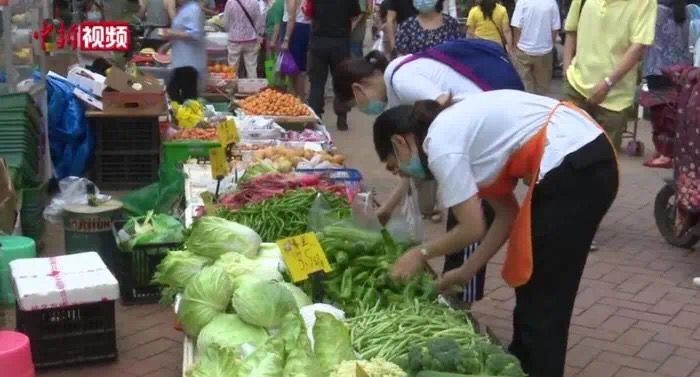

“Our happiness is coming back. I can’t help licking my lips,” commented one Internet user on the news that roadside booths and food stalls are returning to the streets in many Chinese cities, Chinanews.com reported Tuesday.

Citizens of Jinan, capital of east China’s Shandong province, enjoy snacks at a roadside food stall. (File photo/Sun Hongyuan)
The news quickly led to a wave of discussions and excitement online, with many saying, “Great news! I can eat at food stalls again!", The streets are so dull without small shops and booths,” and “Roadside stalls are the soul of a city.”
Roadside booths, street markets, and mobile vendors will not be included in this year’s list of evaluation indicators for the title of National Civilized City, according to a recent document issued by the Office of the Spiritual Civilization Development Steering Commission of the Communist Party of China (CPC) Central Committee.
The move was aimed at enabling efforts to build national civilized cities that play a more positive role in promoting economic and social recovery and meeting people’s needs, according to the office.
Roadside stalls and booths had previously been banned in many cities around the country, as they posed problems for city management and efforts to keep cities clean.
Due to the COVID-19 outbreak, China adjusted its targets for development and stated clearly in its Report on the Work of the Government released during the recently concluded annual session of the country’s top legislature, “This year, we must give priority to stabilizing employment and ensuring living standards.”
“We will stabilize employment, promote income growth and ensure people’s basic needs are met to encourage and enable consumer spending,” said the report.
With epidemic prevention and control measures now becoming the norm across the country, authorities and local governments around the country have started to take the initiative to relax restrictions on roadside stalls and booths in order to boost consumption and increase people’s incomes.

Photo shows a busy small fair on a sidewalk on Yuqian street of Jinjiang district, Chengdu. (Screenshot from a video of Chinanews.com)
Chengdu, capital of southwest China’s Sichuan province, was the first to issue a document on measures to boost economic development by allowing people to set up temporary roadside stalls and booths, shops located near streets to temporarily operate in roadside areas, and shopping malls to hold sales promotion activities in roadside areas.
By May 14, Chengdu had 1,636 roadside operating areas, and allowed 18,260 temporary promotion areas and 16,975 operating spots for mobile vendors, which helped create over 100,000 jobs, according to statistics from the website of Chengdu’s urban city management committee.
More cities in the country have started to loosen restrictions on roadside businesses in a bid to boost local economies.
In Wuhan, the worst-hit Chinese city during the COVID-19 pandemic, five-star hotels have set up roadside stalls selling barbecued snacks.
Hangzhou, capital of east China’s Zhejiang province, has designated certain streets as operating areas for booth and stall vendors.
Nanjing, capital of east China’s Jiangsu province, has set aside areas for more than 1,000 temporary outdoor stalls and booths to operate.
In an effort to standardize the operating activities of booth and stall vendors, some cities have taken novel measures to make sure that roadside businesses can boost local economies while not bringing too many problems.
Wuhou district in Chengdu has issued “green cards” with serial numbers, business locations, and operating hours to owners of roadside stalls and booths in a bid to encourage stall and booth owners to keep their spots clean.
Zhengzhou, capital of central China’s Henan province, has given odd or even numbers to roadside stalls and booths at a night fair, requiring owners to operate only on corresponding odd or even dates.
 Fire brigade in Shanghai holds group wedding
Fire brigade in Shanghai holds group wedding Tourists enjoy ice sculptures in Datan Town, north China
Tourists enjoy ice sculptures in Datan Town, north China Sunset scenery of Dayan Pagoda in Xi'an
Sunset scenery of Dayan Pagoda in Xi'an Tourists have fun at scenic spot in Nanlong Town, NW China
Tourists have fun at scenic spot in Nanlong Town, NW China Harbin attracts tourists by making best use of ice in winter
Harbin attracts tourists by making best use of ice in winter In pics: FIS Alpine Ski Women's World Cup Slalom
In pics: FIS Alpine Ski Women's World Cup Slalom Black-necked cranes rest at reservoir in Lhunzhub County, Lhasa
Black-necked cranes rest at reservoir in Lhunzhub County, Lhasa China's FAST telescope will be available to foreign scientists in April
China's FAST telescope will be available to foreign scientists in April "She power" plays indispensable role in poverty alleviation
"She power" plays indispensable role in poverty alleviation Top 10 world news events of People's Daily in 2020
Top 10 world news events of People's Daily in 2020 Top 10 China news events of People's Daily in 2020
Top 10 China news events of People's Daily in 2020 Top 10 media buzzwords of 2020
Top 10 media buzzwords of 2020 Year-ender:10 major tourism stories of 2020
Year-ender:10 major tourism stories of 2020 No interference in Venezuelan issues
No interference in Venezuelan issues
 Biz prepares for trade spat
Biz prepares for trade spat
 Broadcasting Continent
Broadcasting Continent Australia wins Chinese CEOs as US loses
Australia wins Chinese CEOs as US loses